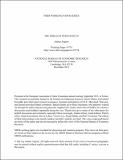The perils of peer effects
Author(s)
Angrist, Joshua
Downloadw19774.pdf (652.2Kb)
OPEN_ACCESS_POLICY
Open Access Policy
Creative Commons Attribution-Noncommercial-Share Alike
Terms of use
Metadata
Show full item recordAbstract
Individual outcomes are highly correlated with group average outcomes, a fact often interpreted as a causal peer effect. Without covariates, however, outcome-on-outcome peer effects are vacuous, either unity or, if the average is defined as a leave-out mean, determined by a generic intraclass correlation coefficient. When pre-determined peer characteristics are introduced as covariates in a model linking individual outcomes with group averages, the question of whether peer effects or social spillovers exist is econometrically identical to that of whether a 2SLS estimator using group dummies to instrument individual characteristics differs from OLS estimates of the effect of these characteristics. The interpretation of results from models that rely solely on chance variation in peer groups is therefore complicated by bias from weak instruments. With systematic variation in group composition, the weak IV issue falls away, but the resulting 2SLS estimates can be expected to exceed the corresponding OLS estimates as a result of measurement error and for other reasons unrelated to social effects. Research designs that manipulate peer characteristics in a manner unrelated to individual characteristics provide the most compelling evidence on the nature of social spillovers. As an empirical matter, designs of this sort have mostly uncovered little in the way of socially significant causal effects. Keywords: causality; social returns; instrumental variables
Date issued
2014-06Department
Massachusetts Institute of Technology. Department of EconomicsJournal
Labour Economics
Publisher
Elsevier
Citation
Angrist, Joshua D. “The Perils of Peer Effects.” Labour Economics 30 (October 2014): 98–108 © 2014 Elsevier B.V.
Version: Original manuscript
ISSN
0927-5371